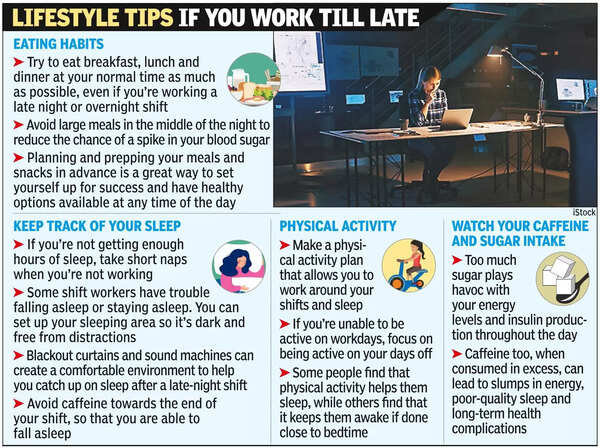- News
- City News
- delhi News
- Working at dead of night? Be alive to grave health concerns
Trending
Working at dead of night? Be alive to grave health concerns

New Delhi: Working night shifts even for short periods can adversely impact one’s health.
This was revealed in a study conducted by scientists at Washington State University and the Pacific Northwest National Laboratory. Researchers did a controlled laboratory experiment with volunteers who were put on simulated night or day shift schedules for three days.Following their last shift, participants were kept awake for 24 hours under constant conditions—lighting, temperature, posture and food intake — to measure their internal biological rhythms without interference from outside influences.

The study published in the journal of Proteome Research, found that just three days on a night shift schedule throws off a person’s protein rhythms related to blood glucose regulation, energy metabolism and inflammation, processes that can influence the development of chronic metabolic conditions — diabetes and obesity.
Energy metabolism suffers, fostering inflammation due to disrupted sleep, irregular meals and exposure to nighttime light.
Dr Manjeeta Nath Das, senior consultant for internal medicine at Narayana Hospital, said: “It is possible for as few as three night shifts to precipitate these disruptions, undermining glucose management and increasing metabolic disorder risks. The disruption of circadian rhythms and metabolic processes can occur rapidly when individuals are exposed to altered sleep-wake cycles and nighttime work schedules.”
The human body has its own biological clock, scientifically referred to as circadian rhythms, usually linked to daylight and nighttime.
“In the morning, your body releases cortisol, a hormone that makes you feel alert and energised. In the evening, our body releases melatonin, which makes you feel sleepy. Your body's circadian rhythm also helps release insulin, a hormone that balances your blood sugar levels. When overnight or rotating shifts disrupt your circadian rhythms, these hormones can also be disrupted. Unbalanced cortisol and insulin levels can increase your blood sugar and cause insulin resistance," Dr Ashok Kumar Jhingan, senior director at the Centre for Diabetes, Thyroid, Obesity & Endocrinology at BLK-Max Super Speciality Hospital, said.
Discussing sleep deprivation resulting from night shifts, the chairman of the department of sleep medicine at Sir Ganga Ram Hospital, Dr Sanjay Manchanda, said: “Sleep deprivation leads to a disruption in the balance of two hormones that control your appetite and fullness — Leptin and Ghrelin. Leptin causes satiety (which means hunger feels satisfied), whereas Ghrelin increases food intake in sleep deprivation, leading to obesity and aggravating diabetes.”
Dr Rajesh Khadgawat, professor in the department of endocrinology at AIIMS, advised minimal eating during night shifts, taking full rest during the day, and avoiding long shift duties in continuation.
“Rest days should be used to cover up for sleep debt rather than leisure activities. Adopt a healthy lifestyle — a balanced diet, regular exercise, quit alcohol and smoking, reduce the amount of tea, coffee and other stimulant drinks,” Dr Vivek Singh, director-pulmonology at Medanta Hospital said.
"Get away from the night shift as soon as possible, especially if a person is obese or has a strong family history of diabetes," Dr Anoop Misra, chairman of the Fortis-Centre of Excellence for Diabetes, Metabolic Diseases, and Endocrinology, said.
This was revealed in a study conducted by scientists at Washington State University and the Pacific Northwest National Laboratory. Researchers did a controlled laboratory experiment with volunteers who were put on simulated night or day shift schedules for three days.Following their last shift, participants were kept awake for 24 hours under constant conditions—lighting, temperature, posture and food intake — to measure their internal biological rhythms without interference from outside influences.

The study published in the journal of Proteome Research, found that just three days on a night shift schedule throws off a person’s protein rhythms related to blood glucose regulation, energy metabolism and inflammation, processes that can influence the development of chronic metabolic conditions — diabetes and obesity.
According to city-based doctors, it is clinically proven that night shift work disrupts the body's circadian rhythms. These are internal clocks that regulate various physiological processes, including metabolism. Night shifts mainly disturb blood glucose regulation. Protein rhythms, crucial for insulin sensitivity and glucose metabolism, become dysregulated, fostering diabetes and obesity.
Energy metabolism suffers, fostering inflammation due to disrupted sleep, irregular meals and exposure to nighttime light.
Dr Manjeeta Nath Das, senior consultant for internal medicine at Narayana Hospital, said: “It is possible for as few as three night shifts to precipitate these disruptions, undermining glucose management and increasing metabolic disorder risks. The disruption of circadian rhythms and metabolic processes can occur rapidly when individuals are exposed to altered sleep-wake cycles and nighttime work schedules.”
The human body has its own biological clock, scientifically referred to as circadian rhythms, usually linked to daylight and nighttime.
“In the morning, your body releases cortisol, a hormone that makes you feel alert and energised. In the evening, our body releases melatonin, which makes you feel sleepy. Your body's circadian rhythm also helps release insulin, a hormone that balances your blood sugar levels. When overnight or rotating shifts disrupt your circadian rhythms, these hormones can also be disrupted. Unbalanced cortisol and insulin levels can increase your blood sugar and cause insulin resistance," Dr Ashok Kumar Jhingan, senior director at the Centre for Diabetes, Thyroid, Obesity & Endocrinology at BLK-Max Super Speciality Hospital, said.
Discussing sleep deprivation resulting from night shifts, the chairman of the department of sleep medicine at Sir Ganga Ram Hospital, Dr Sanjay Manchanda, said: “Sleep deprivation leads to a disruption in the balance of two hormones that control your appetite and fullness — Leptin and Ghrelin. Leptin causes satiety (which means hunger feels satisfied), whereas Ghrelin increases food intake in sleep deprivation, leading to obesity and aggravating diabetes.”
Dr Rajesh Khadgawat, professor in the department of endocrinology at AIIMS, advised minimal eating during night shifts, taking full rest during the day, and avoiding long shift duties in continuation.
“Rest days should be used to cover up for sleep debt rather than leisure activities. Adopt a healthy lifestyle — a balanced diet, regular exercise, quit alcohol and smoking, reduce the amount of tea, coffee and other stimulant drinks,” Dr Vivek Singh, director-pulmonology at Medanta Hospital said.
"Get away from the night shift as soon as possible, especially if a person is obese or has a strong family history of diabetes," Dr Anoop Misra, chairman of the Fortis-Centre of Excellence for Diabetes, Metabolic Diseases, and Endocrinology, said.
End of Article
FOLLOW US ON SOCIAL MEDIA










